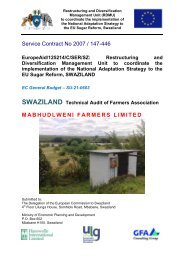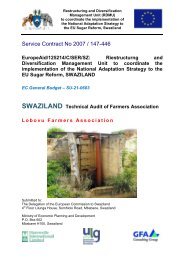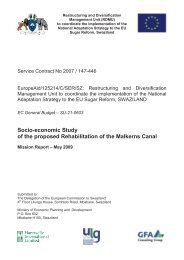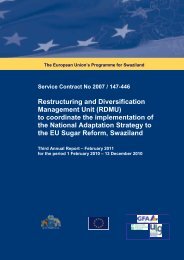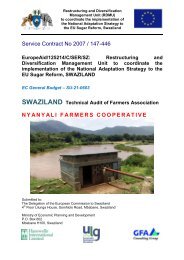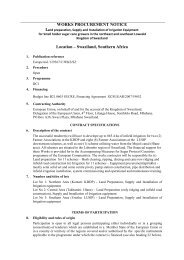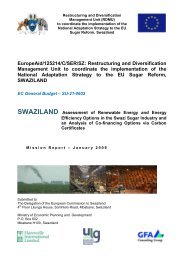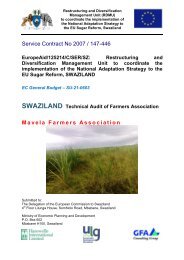Service Contract No 2007 / 147-446 Strategic ... - Swaziland
Service Contract No 2007 / 147-446 Strategic ... - Swaziland
Service Contract No 2007 / 147-446 Strategic ... - Swaziland
- No tags were found...
Create successful ePaper yourself
Turn your PDF publications into a flip-book with our unique Google optimized e-Paper software.
5.9.4 Options to address the key aspectThere are opportunities to enhance the regulation of atmospheric emissions. Mainly emissionlimits should be established in line with international standards, and the category of “anyother potentially toxic compounds” should be avoided.Once emission limits are established, then mechanisms should be created to ensure thecompetent authority has authority over the operation of air polluting industrial activities (e.g.through atmospheric emissions permits).5.10 Other aspects5.10.1 Positive impactsThe implementation of the NAS will produce a series of positive impacts as well. These areoutlined below.- All efforts at increasing co-generation using tops and trash will result in: increasedenergy efficiency; reduced dependency on imported energy; reduced atmosphericemissions and emission of GHG due to reduced burning of coal; and reducedemission of POPs due to reduced cane burning at the sugar mill estates. There isalso an opportunity for small cane growers to increase their profits by selling theirtops and trash to the mills for the production of electricity.- Actions oriented to reduce the debt burden will have positive effects on poverty andsustainability of small scale sugar cane growers.- Actions at promoting fair trade in the sugar sector will allow, if successful, toenhance the overall environmental and social management in the sugar sector,especially for small scale farmers. This enhanced management may result inbenefits, e.g. related to water contamination from agricultural run-off, labourconditions, and general good environmental farm practices.- The improvement of transport infrastructure has a potential to reduce transportcosts, as long as mechanisms are in place to ensure that cost reductions arereflected in the transport fees paid by the farmers.5.10.2 Other negative impactsAs well a series of other minor negative impacts may result from implementing the NAS.These are not to be neglected, but are not considered to be priority issues.- Contamination and health issues associated to inadequate management ofhazardous waste by cane producers, especially reuse of agrochemicals’ containers,which are often used for carrying and storing drinking water.- Safety of field labourers is a concern, and this may be aggravated with expansionof sugar cane. The shift to manual green cane harvesting will increase risk ofaccidents by cane cutters, who would have to be provided adequate protectiveequipment.- Soil salinisation is a problem associated to inadequate irrigation and drainage. Thishas already been a problem in some lands under sugar cane, and should not beneglected, as inadequate monitoring may lead to drop of yields and risk of landabandonment.RDMU (<strong>Strategic</strong> Environmental Assessment of the National Adaptation Strategy) - Page 101



